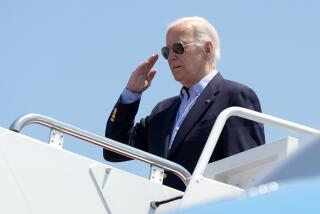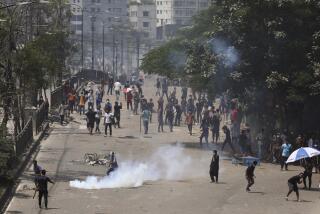Nationalism Is Changing the Face of Taiwan Politics
Su Chin, who is 32 and seven months pregnant, sat over dinner in the back room of her Taiwanese family’s storefront home here the other day and explained why her husband, a local surgeon, was taking time off from work to run for political office.
“This election is very important for Taiwan’s destiny,” she said. “Taiwan is changing. Everything is changing here. Our president is maybe feeling not so good, and time is very short. For hundreds of years, Taiwan has been controlled by other big countries. We just don’t like being governed by these people from the (Chinese) mainland.”
Those sentiments reflect the views of a growing and significant portion of Taiwan’s population of 19 million.
Middle-Class Activists
As this island becomes increasingly prosperous and the ruling Kuomintang (Nationalist Party) opens the way for a freer, more democratic political climate, a young generation of middle-class activists has begun to press the cause of Taiwanese nationalism with new urgency.
In elections Saturday, candidates of a new Democratic Progressive Party, which challenged the assumption that Taiwan’s future is inextricably tied to that of China, rolled up impressive vote totals against the Kuomintang, which came here from the Chinese mainland in 1949.
For the last 37 years, Taiwan law has forbidden the formation of new political parties. But President Chiang Ching-kuo recently announced plans to lift this ban, and the Democratic Progressives, while still technically illegal, were allowed to function as a de facto opposition party in this year’s election. The result was a decline in popular support for the Kuomintang.
In past elections, the Kuomintang, which still claims to be the legitimate government for all of China, had polled 70% to 73% of the popular vote. The Nationalists fielded far more candidates than the Democratic Progressives this year, and Kuomintang officials had set the figure of at least 70% of the popular vote as their benchmark of success.
Vote Drops to 66%
Instead, the ruling party’s vote dropped to 66% for the Legislative Yuan, Taiwan’s main lawmaking body, and to 60% for the National Assembly, the government version of an electoral college. Democratic Progressive candidates received approximately 22% of the vote for seats in these forums, and the remainder went to independent candidates.
Of the 44 Democratic Progressive candidates running, 23 were elected. Among them was Su’s physician-husband, Dr. Su Pei-Yuan, who won a seat for the Democratic Progressives in the National Assembly from his district in Kaohsiung county.
Democratic Progressive successes were particularly surprising because the new party was formed only 10 weeks ago, and its candidates ran with only a fraction of the money and organization available to the Kuomintang.
In Kaohsiung City, Chang Chung-hsiung, a Democratic Progressive, estimated last week that he would spend about $60,000 in his race for the Legislative Yuan and that each Kuomintang rival would spend at least 10 times as much.
Third Out of 11
Despite his complaints of relative poverty, Chang was elected Saturday and ranked third in the popular vote among the 11 candidates in his district. Another Democratic Progressive candidate came in first.
The Democratic Progressives also ran without access to television or radio. Taiwan’s broadcasting media, which are under Kuomintang control, provide no air time for candidate debates, forums, or political advertising.
“We just can’t get on television,” Daniel Huang, a Democratic Progressive campaign organizer, said a week ago. “To get our message, people have to come to our rallies and hear our speeches. When the weather’s bad like it is this week, people have to get out their umbrellas and come out in the rain.”
Still, Huang’s candidate, Chou Ching-yu, whose husband, Yao Chia-wen, has been in jail for seven years for his role in a 1979 anti-government riot at Kaohsiung, managed to outpoll all Kuomintang candidates and come in first in the balloting for the National Assembly in the city of Taipei.
Despite the hurdles it faced, the new party was carried along by the cause of Taiwanese nationalism and by its ability to exploit some popular resentment of the Kuomintang regime.
‘Self-Determination’ Urged
Although President Chiang had warned that new parties will not be allowed to advocate independence for Taiwan, the Democratic Progressives’ platform skirted the issue by calling for “self-determination” of Taiwan’s future by all residents of the island.
Native Taiwanese make up 85% of the island’s population, and most of them speak Taiwanese or Hakka dialects rather than, or in addition to, the official Chinese language of Mandarin. The other 15% of the population is made up of so-called “mainlanders” who have been living on Taiwan since the Kuomintang fled here from China at the end of the civil war in 1949.
The new party was helped by a climate in which authorities allowed far more leeway than ever before for stump speeches, political oratory and appeals to ethnic sentiment.
“This year, for the first time, Taiwanese candidates could get up on the stump and say without fear, ‘I am Taiwanese, not Chinese,’ ” observed Leonard Wu, editor in chief of a Kaohsiung-based opposition political magazine, the Neo-Formosa Political Review. “Ten years ago, you couldn’t ever say that in public, not even at election time.”
‘Living a Lie’
At one typical campaign rally in Kaohsiung last week, for example, a supporter of an opposition candidate told the crowd through a loudspeaker, “For 40 years, the Kuomintang has been living a lie. They want to recover the Chinese mainland, but it is impossible.” Even when defectors come to Taiwan from Communist China, the orator continued, “we ought to send them back.”
Some intellectuals here contend that recent political developments are also a reflection of Taiwan’s affluence, which has allowed the island’s inhabitants to focus on social concerns rather than bread-and-butter economic issues.
In Kaohsiung, a once-grimy port city, gleaming new fashion boutiques and Honda dealerships are sprouting up in the midst of the old noodle shops.
“The older generation worked very hard to develop the economy, to have food to eat,” said Yu Tzong-shian, vice president of the Chung-hua Institution for Economic Research. “The younger generation is willing to challenge tradition. It’s a little like what happened in the United States in the 1960s.”
For the Taiwanese, political life has taken on greater urgency because of the belief that President Chiang--who is 76 and reportedly in frail health--may die soon and thereby touch off a battle for succession that could affect the island’s future.
‘Kuomintang Is Dying’
“We think Chiang Ching-kuo is dying, and that the Kuomintang is dying, too,” said Wu, the magazine editor, who asserted that his own goal is “to overthrow the Kuomintang regime.”
Against the new party’s nationalistic appeals, the Kuomintang pressed the theme that under its leadership, Taiwan has achieved stability and prosperity.
Some of the ruling party’s candidates avoided discussion of Taiwan’s political future and stuck with local issues.
In Kaohsiung, one official party candidate, Huang Cheng-hsiung, said in an interview that he believes the most important issue in the election was a proposal to combine the administrations of Kaohsiung city and its harbor. He won election to the Legislative Yuan.
Kuomintang leaders point to the election and to official tolerance of the Democratic Progressives as an indication that political life in Taiwan is becoming more democratic.
Hope for World Support
The hope is that the government will be able to attract greater attention and support from the United States, Japan and Western European nations, none of which have diplomatic relations with Taiwan.
“This is the first time on Chinese soil that we have had a significant democratization,” asserted Ma Ying-jeou, 36, the Kuomintang’s deputy general secretary and a recent graduate of an American law school.
At a press conference last week, Ma sought to downplay the cultural differences between Taiwanese and mainland Chinese.
“For some sectors of society, you can still identify Taiwanese and Chinese, but for my generation, it’s getting difficult,” he said. Younger Chinese, he went on, have come to “identify with this island.”
Such sentiments are deeply disturbing to authorities in Peking. The Communist regime has said it will not tolerate the notion of an independent Taiwan, and it has been trying desperately to entice the older generation of Chinese Kuomintang leaders, who grew up on the mainland, to enter into negotiations leading to reunification.
Fending Off Communists
Some analysts have suggested that to a certain extent, permitting the new political party serves the Kuomintang’s interest in fending off the Communist regime. The Democratic Progressives provide a vehicle for airing the idea that Taiwan should someday be considered an independent nation, but the new party does not yet threaten the Kuomintang’s firm control over the government here.
“The Kuomintang is starting a process under which, in 10 years or so, it may be able to argue that Taiwan’s economic system and its political system are both fundamentally different from the one in China itself,” a Western European diplomat in Peking observed.
Despite its strong showing in Saturday’s election, the new party will now face a number of difficulties.
The party was put together hastily in September and so far amounts to little more than a short-term marriage of convenience between moderate and radical factions of the Kuomintang’s political opposition.
Many officials both inside and outside the new party predict that there may soon be a series of battles for leadership of the opposition party and that it may eventually split into two or more different parties.
“We’ve been busy with the election,” one party organizer said last week. “But after the election, there will be more time for power struggles.”
More to Read
Sign up for Essential California
The most important California stories and recommendations in your inbox every morning.
You may occasionally receive promotional content from the Los Angeles Times.






